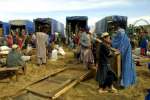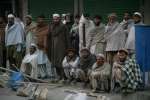UNHCR aids refugees on the Greek Islands
News Stories, 6 November 2015
GENEVA, Nov 6 (UNHCR) – UN refugee agency staff have worked throughout the week to provide emergency shelter and support to thousands of refugees, migrants and the local host communities on the Greek Islands.
An estimated 20,000 refugees and migrants are currently on the Islands of Chios, Kalymnos, Kos, Lesvos, Leros and Samos, straining limited reception facilities and forcing many, including women and children, to sleep out in the open.
As boats packed with thousands of new arrivals continued to land on the Islands throughout the week, reception efforts were further stretched by a shipping strike that cut travel to and from mainland Greece for four days, until it was resolved on Friday (November 6).
"This situation has underscored UNHCR's repeated calls for improved reception conditions and increased reception capacity in Greece," UNHCR spokesperson William Spindler told reporters at a news conference in Geneva.
"The recent agreement of more reception places in Greece will be a key factor in stabilizing the situation, and supporting the relocation programme. UNHCR is working with the EU and Member States to support this initiative," he added.
On Lesvos, which is separated from Turkey by a 10-kilometre channel, there were an estimated 7,000 to 10,000 refugees and migrants midweek, most of them in and around the main city of Mytilini.
Hundreds were staying in the port area in tents and thousands at the Moria site. UNHCR supported Greek authorities by providing additional housing units and a large Rubb hall warehouse tent – although huge demand forced many to sleep out.
In addition to transportation, UNHCR also distributed blankets, sleeping mats and high-energy bars to help those outside to stay warm, including women and children. Staff also used a public address system to inform people about the strike.
"UNHCR staff are identifying those with specific needs and prioritizing them for what little accommodation is available," Spindler said. "We are also erecting more family refugee housing units, but the overcrowding makes finding space extremely difficult."
Similar provisions were made to aid refugees and migrants on Chios – where there were at least 1,700 new arrivals on Thursday, and Samos, where around 900 people arrived, exacerbating an existing shortage of accommodation.
Overcrowding has made aid distribution difficult, but UNHCR is identifying those with specific needs and facilitating registration. Food is being distributed by the municipality, the military, an NGO and volunteers. UNHCR contributes with high energy bars.
On Kos, good weather and calm seas meant continuing arrivals and another tragedy at sea yesterday that left a 4-year-old child dead and a 6-year-old missing. UNHCR staff report more Afghan and Iranian families arriving, although Syrians remain the majority. On the island, there are few local resources available for the refugees and migrants.
In nearby Kalymnos, the local community support network has provided good support for the arrivals, including accompanying survivors of a recent shipwreck to Kos for funeral services. About 250 refugees are currently on the island.
"Under these circumstances, throughout the islands, thousands of refugee women and children are having to stay out in the open at night, or in overcrowded and inadequate reception facilities, where they are exposed to all kind of risks, including sexual violence," Spindler said.
"Providing adequate shelter to them is essential in order to protect them and, with the arrival of winter, will soon become vital," he added.
Unaccompanied and separated children are a growing concern, with UNHCR helping in family reunification. UNHCR is also providing psychosocial assistance and legal aid to victims of shipwrecks. Volunteers and partners continue to be instrumental in filling some of the most acute gaps.
UNHCR will continue to support the Greek authorities on improving reception and registration on the islands. We are appealing for US$32 million for winter preparations in Greece. This is part of an overall US$96 million winter plan for Greece and the Balkans that we announced yesterday. For more details of that plan, visit our website.




















































